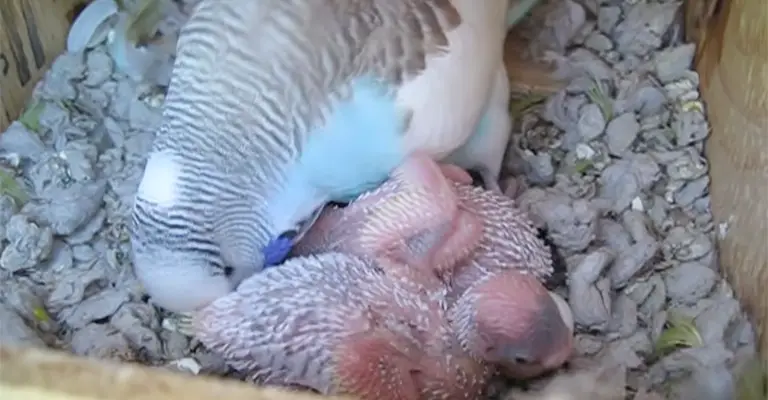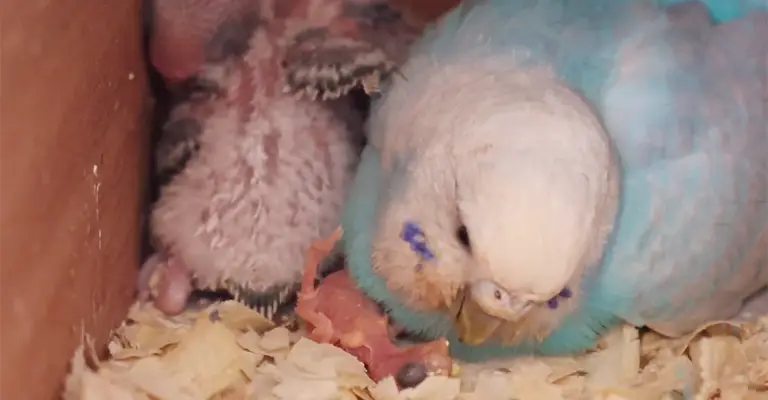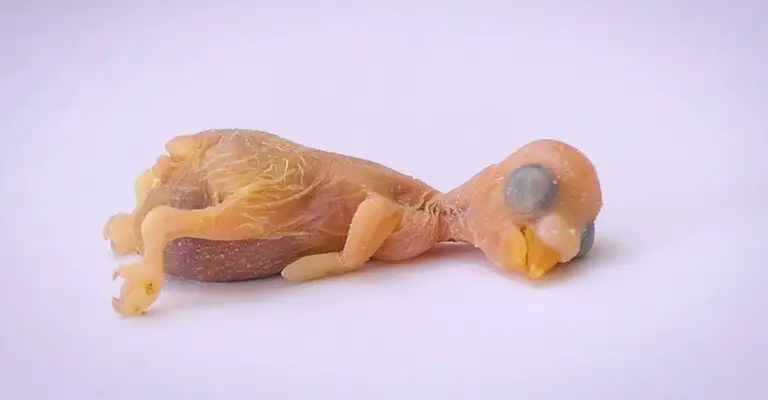In the avian world, where nurturing and protecting offspring are paramount, the phenomenon of budgies (also known as parakeets) killing their own offspring might seem baffling. This behavior, known as filial cannibalism, challenges conventional notions of parental care.
The seemingly contradictory act, where parents turn from caregivers to predators, has perplexed researchers and bird enthusiasts alike. This article delves into why budgies kill their babies, aiming to uncover the underlying reasons behind their surprising tendency to kill their babies.
By examining potential triggers such as stress, environmental factors, and genetic predispositions, we hope to shed light on this fascinating yet unsettling aspect of budgie reproductive dynamics.
Through a combination of scientific research and expert insights, we embark on a journey to comprehend the mysteries of why these colorful and charming birds occasionally display such perplexing and seemingly counterintuitive behaviors.

Why Do Budgies Kill Their Babies?
Budgies may engage in infanticide or filial cannibalism due to various factors, although it’s not a behavior that’s common in all budgies. Stress and environmental triggers are often responsible for this behavior. Below are the details:
Environmental Stressors
One of the leading causes of filial cannibalism in budgies is the presence of environmental stressors. Overcrowding within the nesting area or limited availability of resources can trigger heightened levels of stress among budgie parents.
As a result, the stress response can lead to unusual behavior, causing them to harm or even consume their own offspring.
Competition for Resources
Budgies, like many other species, are hardwired to ensure the survival of their own genes.
In situations where resources such as food are scarce, budgie parents may resort to eliminating weaker or sickly chicks to allocate limited resources to the stronger ones.
Inadequate Nest Conditions
Inadequate nesting conditions can play a significant role in triggering filial cannibalism. If the nest is poorly constructed or lacks proper insulation, it can expose the chicks to temperature fluctuations, predators, or other dangers.
In such cases, budgie parents might prioritize their own survival and well-being over that of their offspring.
Genetic Predisposition

Genetics also play a role in budgie behavior. Some individuals might have a genetic predisposition that makes them more prone to exhibiting filial cannibalism.
This can result in certain pairs of budgies displaying the behavior consistently across multiple breeding cycles.
Adaptive Strategies
From an evolutionary perspective, filial cannibalism might be an adaptive strategy under specific circumstances.
By culling weaker offspring, budgies could increase the overall fitness of their surviving chicks, ensuring that the best-adapted individuals contribute to the next generation.
Predation Risk
In the wild, budgies face numerous predators that pose a threat to their offspring. When sensing danger or the presence of predators near the nest, budgie parents might engage in filial cannibalism as a desperate attempt to eliminate any signs of their presence.
This macabre strategy aims to reduce the chances of attracting attention and safeguard the remaining chicks.
Hormonal Imbalances
Hormonal imbalances can also contribute to the occurrence of filial cannibalism in budgies. Fluctuations in hormone levels during breeding can impact the behavior and decision-making of budgie parents.
These hormonal shifts might lead to erratic or abnormal parenting behaviors, including the harmful act of killing their own offspring.
Lack of Parental Experience
Young or inexperienced budgie parents may not possess the necessary parenting skills to care for their offspring effectively.
In some cases, they might inadvertently harm their chicks while attempting to feed, clean, or protect them. Such instances can result in unintentional filial cannibalism.
Nest Disturbances
Human interference or other external disturbances near the nesting area can trigger stress responses in budgie parents. Startled or agitated parents might react impulsively, leading to aggressive behavior directed at their own chicks.
This behavior can escalate into filial cannibalism if the parents perceive their chicks as potential threats.
Nutritional Deficiencies
A lack of essential nutrients in the diet of budgie parents can impact their ability to provide adequate care for their chicks. Malnourished parents might resort to filial cannibalism as a response to their own physiological stress and the need to secure their own nourishment.
Overactive Aggression
In some cases, budgies may have an overactive aggression response, which can manifest as attacking their own offspring. This behavior might be an exaggerated expression of their natural aggression, causing them to harm their chicks unintentionally.
Unraveling the myriad reasons behind budgies killing their own offspring reveals the intricate interplay of biological, environmental, and behavioral factors. While the behavior itself is unsettling, it underscores the adaptability of living beings in the face of challenges.
Why Do Budgies Abandon Their Babies?

Understanding the reasons behind budgie chick abandonment highlights the delicate balance between parental instincts, survival strategies, and environmental cues.
While the behavior might be disheartening, it reflects the adaptability of budgies in responding to their changing circumstances. Here are the details:
Nest Disturbances
Budgies are highly sensitive to disturbances around their nesting area. If they perceive threats from predators, human interference, or even excessive noise, they might abandon their nests and chicks to seek safety elsewhere.
Lack of Parental Experience
Inexperienced budgie parents, especially young or first-time breeders, might struggle to fulfill their parenting responsibilities effectively.
They could become overwhelmed by the demands of caring for their chicks, leading them to abandon the nest in favor of self-preservation.
Stress and Anxiety
Budgies, like all animals, can experience stress and anxiety. Environmental changes, disruptions in routine, or the presence of other pets or people in the vicinity can trigger stress responses that cause budgie parents to abandon their young.
Illness or Weakness
If budgie’s parents sense that a chick is weak, sickly, or unlikely to survive, they might abandon it as a survival strategy. In the wild, this behavior ensures that limited resources are allocated to healthy offspring with a higher chance of survival.
Lack of Food or Resources
Insufficient access to food or other essential resources can lead budgie parents to prioritize their own survival over that of their chicks. If they can’t find enough nourishment to sustain themselves, they may abandon the nest.
Hormonal Changes
Hormonal fluctuations during the breeding period can affect budgie parents’ behavior. Sudden shifts in hormone levels might cause them to lose interest in caring for their chicks, leading to abandonment.
Genetic Predisposition
Some budgies might have genetic predispositions that make them less inclined to care for their offspring. This can lead to abandonment as the parents lack the innate nurturing instincts necessary for successful parenting.
Nest Conditions
Unsuitable nest conditions, such as poor insulation or exposure to extreme temperatures, can prompt budgie parents to abandon their nest. They might recognize that the environment is unsuitable for raising chicks and choose to leave.
Reproductive Failure
Budgies might abandon their chicks if they’ve experienced previous breeding failures. This can result from unfertilized eggs, low hatch rates, or chicks that didn’t survive. The parents may perceive the nest as unproductive and decide to abandon it.
Predation Threats
If budgie parents sense the presence of predators in the area, they might abandon the nest to avoid drawing attention to their chicks. This can be a protective measure to ensure the survival of the parents themselves.
Why Do My Baby Budgies Keep Dying?

The loss of baby budgies can be distressing and is often due to a combination of factors. Common reasons for the death of baby budgies include:
Inadequate Nutrition
If the parent budgies are not providing sufficient nutrition to the chicks, it can lead to weakened immune systems and overall health issues, making the chicks susceptible to illnesses and death.
Bacterial or Fungal Infections
Young budgies are more vulnerable to bacterial and fungal infections, which can spread quickly within the confined space of the nest. Inadequate hygiene or contaminated food can contribute to these infections.
Overcrowding or Stress
Overcrowding in the nesting area or excessive stress, caused by frequent disturbances or the presence of other pets, can lead to stress-related health problems in the chicks.
Genetic Factors
Genetic predispositions to health issues or weak immune systems can make some baby budgies more prone to illness and less likely to survive.
Lack of Experience
Inexperienced parent budgies might struggle to properly care for their chicks, leading to inadequate feeding, grooming, or protection.
Environmental Conditions
Fluctuations in temperature, inadequate nest materials, or poor ventilation can negatively impact the chicks’ health and survival.
Parental Neglect
In some cases, parent budgies might neglect their chicks due to stress, illness, or disinterest, leaving the chicks vulnerable to various health problems.
Predation
If there are predators around the nesting area, such as other pets or insects, they can pose a threat to the chicks and lead to their demise.
Congenital Issues
Some chicks might have congenital health issues or birth defects that become apparent shortly after hatching, leading to their early death.
Parasites
Parasites can weaken the chicks’ immune systems and cause a range of health problems that contribute to their death.
To improve the chances of successful breeding and chick survival, ensure that the parent budgies are in good health, provide a suitable nesting environment, offer a balanced and nutritious diet, minimize disturbances, and maintain proper hygiene.
FAQs
To enhance the chances of baby budgie survival, provide a clean and comfortable nesting environment. Offer a balanced diet that includes appropriate baby bird formula or a mix of nutritious foods.
Parent budgies might neglect their chicks due to various factors such as stress, illness, lack of experience, or genetic predispositions.
Some budgies might not exhibit strong parental instincts. In such cases, you might need to step in and hand-raise the chicks.
Separating the parent budgies from their chicks immediately might not be necessary. However, if you notice consistent neglect or aggression from the parents, you might need to intervene to ensure the chicks’ safety and care.
Maintain a clean and hygienic environment for the budgies. Regularly clean the nesting box, replace nesting materials, and provide fresh food and water. Avoid overcrowding and ensure good ventilation.
Keep an eye out for signs of weakness, lethargy, abnormal behavior, labored breathing, lack of appetite, or changes in droppings.
If the chicks appear fluffed up, have crusty eyes or beaks, or display any signs of distress, it’s important to seek veterinary attention promptly.
Conclusion
The behavior of budgies killing their own offspring, known as filial cannibalism, is a complex phenomenon that arises from a combination of factors.
While it might seem counterintuitive for parents to harm their own young, this behavior is often a result of stressors and environmental conditions.
Scientific research suggests that factors such as overcrowding, lack of resources, and high levels of stress can trigger this behavior, pushing budgie parents to resort to extreme measures.
Understanding the underlying triggers of filial cannibalism is crucial not only for bird enthusiasts but also for researchers studying animal behavior.
While filial cannibalism remains a puzzling aspect of budgie behavior, continued research and observation will help us refine our understanding of this phenomenon.
By respecting the complexity of nature’s designs, we can appreciate the diversity of strategies that animals employ to navigate the challenges of reproduction and survival in an ever-changing world.